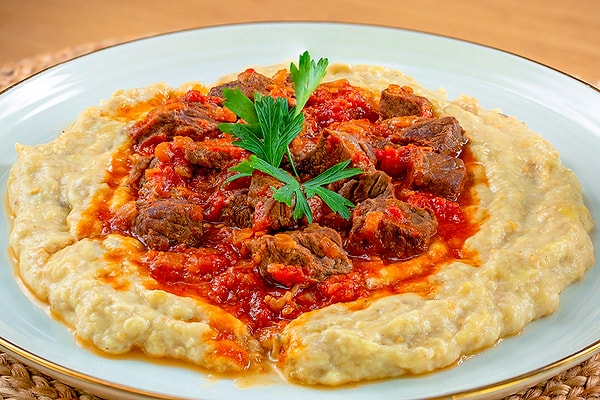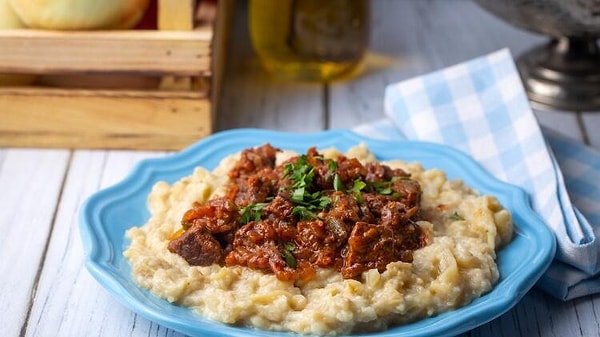Hünkar Beğendi, also known as 'Sultan's Delight,' is a mouthwatering Turkish dish that is deeply rooted in the country's rich culinary history. This regal delicacy combines tender, succulent meat with a creamy, velvety eggplant puree, creating a harmony of flavors fit for royalty. Whether you are a fan of Turkish cuisine or eager to explore new culinary delights, Hünkar Beğendi is a must-try dish that will leave you craving for more.
Hünkar Beğendi: A Delicious Turkish Delight for Royalty

History of Hünkar Beğendi

The origin of Hünkar Beğendi can be traced back to the Ottoman Empire, where it earned its name 'Sultan's Delight' due to its popularity among Ottoman sultans and their guests. It is said that Sultan Murad IV, one of the notable Ottoman rulers, was particularly fond of this dish, and his admiration for it led to its prominence in Ottoman cuisine. Over the centuries, Hünkar Beğendi has remained a symbol of culinary excellence, carrying the essence of the Ottoman culinary heritage to modern times.
Ingredients for Hünkar Beğendi

Lamb or Beef: Traditionally, Hünkar Beğendi is made with tender, slow-cooked lamb or beef. The meat is simmered with aromatic spices until it becomes incredibly tender and flavorful.
Eggplant: The star of the dish is the eggplant, which is roasted until smoky and charred, enhancing its natural sweetness and depth of flavor.
Milk and Butter: To create the creamy, luscious eggplant puree, milk and butter are combined with the roasted eggplant, adding richness and a velvety texture to the dish.
Cheese: The eggplant puree is further enriched with the addition of Turkish kasar cheese or other suitable melting cheeses, contributing to the dish's signature creamy consistency.
Tomato Paste and Spices: A flavorful tomato paste, along with a blend of spices like garlic, black pepper, and salt, enhances the taste of the meat and eggplant puree, creating a delightful combination of flavors.
Ingredients
500g lamb or beef, cubed
2 large eggplants
1 cup milk
4 tablespoons butter
1 cup Turkish kasar cheese (or any suitable melting cheese)
2 tablespoons tomato paste
3 cloves garlic, minced
1 teaspoon ground black pepper
Salt to taste
Chopped parsley for garnish
How To Make It
Preheat the oven to 200°C (390°F). Pierce the eggplants with a fork and roast them on a baking sheet until the skin is charred and the insides are soft and cooked.
Remove the eggplants from the oven, peel off the charred skin, and transfer the cooked flesh to a bowl.
Mash the roasted eggplant with a fork or blend it to achieve a smooth, creamy texture.
In a separate saucepan, heat the milk and butter until the butter melts.
Add the milk and butter mixture to the mashed eggplant and stir well.
Gradually add the grated cheese to the eggplant mixture, stirring until the cheese is fully melted and incorporated.
Season the eggplant puree with salt to taste.
In another pan, sauté the cubed meat with minced garlic, tomato paste, ground black pepper, and salt until the meat is fully cooked and tender.
Serve the meat on top of the creamy eggplant puree and garnish with chopped parsley.
Serving Options for Hünkar Beğendi
Hünkar Beğendi is a versatile dish that can be served in various ways to suit different palates and occasions. Here are some serving options to enjoy this regal Turkish delight:
Classic Hünkar Beğendi: Serve the creamy eggplant puree with tender, slow-cooked lamb or beef on top for a classic and satisfying presentation.
Vegetarian Option: For a vegetarian twist, substitute the meat with roasted vegetables like mushrooms, zucchini, or bell peppers, allowing everyone to indulge in this delectable dish.
Garnishes: Sprinkle chopped parsley or dill on top of Hünkar Beğendi to add a fresh, herbal touch and elevate the presentation.
Side Dishes: Accompany Hünkar Beğendi with traditional Turkish side dishes like rice pilaf, cacık (yogurt and cucumber salad), or fresh Turkish bread to complete the meal.

